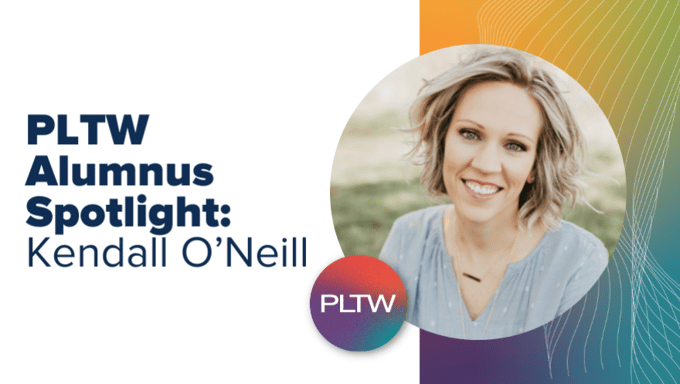For nearly 25 years, PLTW has offered transformative classroom and learning experiences for PreK-12 students. Now, many of those students are professionals in STEM fields. We recently reached out to several PLTW alumni to learn more about their educational and career journeys and find out what advice they have for current PLTW students. If you are a PLTW alumnus interested in sharing your story, we’d love to hear from you here.
Kendall O’Neill lives in Richmond, Virginia and is the Director, Strategic Partnerships at Acuity Brands, Intelligent Spaces Group. In high school, Kendall completed Principles of Engineering and Introduction to Engineering Design in the PLTW Engineering program.
In what grades did you participate in PLTW? What were some of your most memorable experiences from PLTW?
I participated in PLTW my junior and senior year of high school (2003-2005). Although that was almost 20 years ago, I still remember working on the Rube Goldberg project and having the opportunity to "tinker" with "things." I am very much a person who "learns by doing" and these classes were refreshing and certainly piqued my interest in continuing to pursue engineering in college.
What did your journey look like to get to where you are today?
After high school, I entered Purdue University with the intention of completing the biomedical engineering program. Two years into the program, I changed course slightly and finished with a degree in selling and sales management with an interest in pursuing a role in technical sales. I worked part-time as an intern through college at Caterpillar and anticipated a full-time role in their rotational program post-graduation; however, the state of the economy in the spring of 2009 redirected me to a position in the Sales Development Program at Siemens Building Technologies. I relocated to Richmond, Virginia after graduation and spent 12 years with Siemens selling products and services for the Building Technologies portfolio (Building Automation, Fire, Security, Mechanical, Electrical, and Energy systems) to end users in various vertical markets, including higher education campuses, K-12 schools, data centers, municipal facilities, and healthcare systems. While at Siemens, I also had a role within the operations team as a National Business Development Manager for our Digital Services Center where I supported our field offices in selling and implementing remote and cloud-based services.
What is your current role within your company - What are your responsibilities in this position?
I work within the Intelligent Spaces Group at Acuity on the Atrius Building Insights campus team. The Atrius Building Insights platform is a visualization tool that consolidates data sources (IOT sensors, utility bills, building energy meters, etc.) and correlates the data against budgets, baselines, normalizations, and forecasts. Our customers are often energy and sustainability managers, facility departments, CFOs, and CTOs who are responsible for a large portfolio of assets with disparate data sets. As the Director of Strategic Partnerships, I support our partners (systems integrators and consultants who have a license to resale our platform) by enabling platform users and expanding on use cases that help them grow their business. I also consult with enterprise customers on their digital and sustainability strategies by leveraging our hardware solutions and software applications to align with their strategic initiatives. Through the implementation of these strategies, we can directly impact their energy and cost reduction goals and lead them on their digitalization journey.
What did you learn in PLTW that still helps you today?
I think what has remained with me the most about my experience in PLTW is focusing not only on what we learn but how we learn. I grew up on a farm in Indiana and was always very curious about how things worked. I look back on my upbringing and see how problem solving and critical thinking were seeded very early in my education. Prior to the PLTW classes, it seemed as though those skills were only learned and tested with a paper and pencil through complex math and science problems and exams. The PLTW courses were exciting to me – a new way of learning that allowed me to learn with my hands and physically experience those skills – education felt tangible at that point, just like it was on the farm as a kid. It didn't feel like school. When I look at my career, the Building Technologies industry was very foreign to me at first but I was firmly grounded in the skills that are flexed and developed as part of PLTW coursework and that gave me confidence in any professional setting. The soft skills that I had practiced so often working in a collaborative environment, communicating project tasks and goals, and learning how to be resourceful are transferable in any industry and "real-world" application.
Do you have any advice for current PLTW students?
It is easy to see the path ahead if someone lays it out for you. Spend time in your own head understanding what makes you tick, push yourself to do hard things, get uncomfortable, and try something new. Be proud to write your own story that is uniquely you.
Anything else you’d like to add?
As a woman in a traditionally male dominated industry and career, I would encourage other young women to be confident in the sound of your own voice. I have often found that we have a different perspective to share because we see things through a different analytical lens. Your input will enhance and enrich an evaluation; it could change the trajectory of a project entirely! You have a spot at the table.


